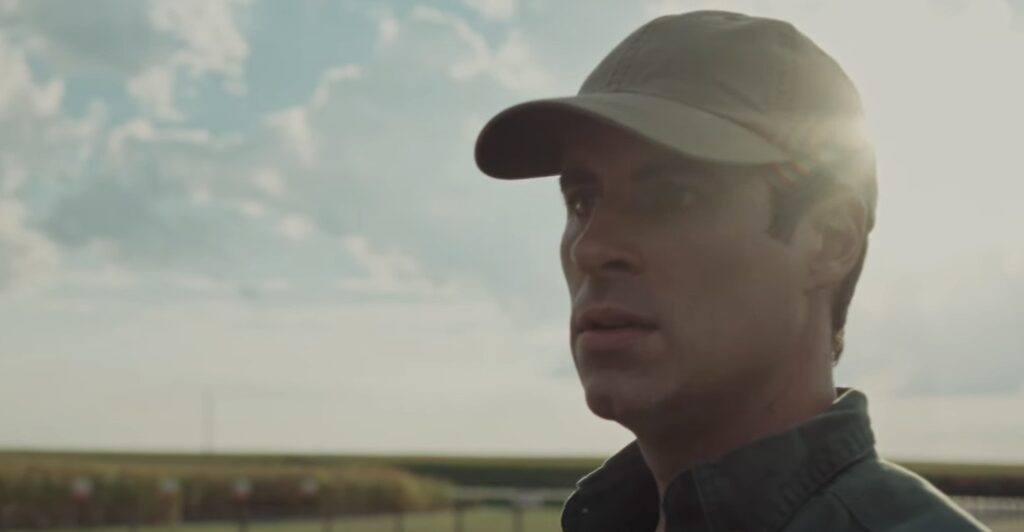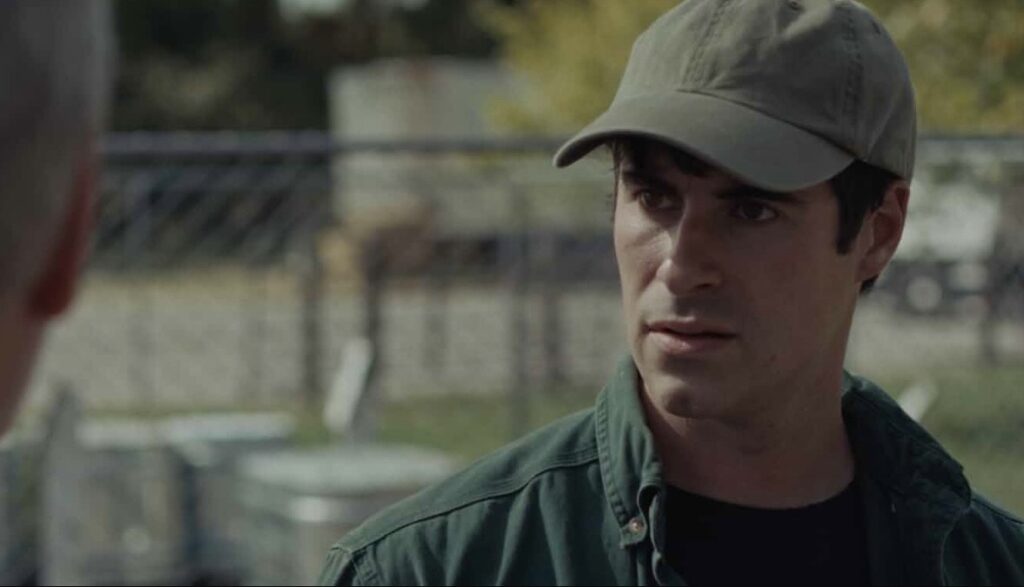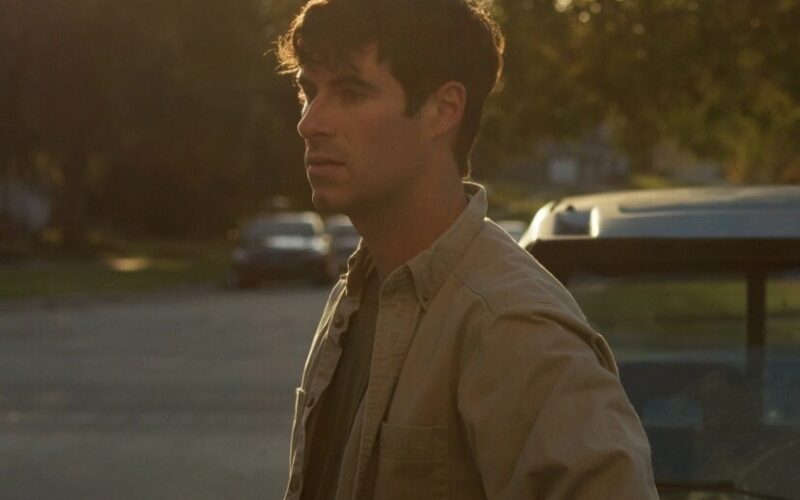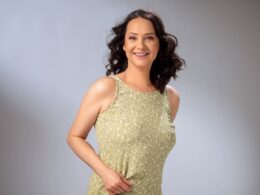Following a celebrated festival run — and Ridley’s Best Actor win at the Madrid Film Awards — Knee High has found a new audience on Amazon, where its tender exploration of identity, legacy, and love continues to resonate. In this conversation, Ridley reflects on the project’s deeply personal impact, his collaboration with Vonn, and the lessons carried forward into his next roles.
‘Knee High’ has been described as a Malick-like meditation on grief and identity. What was your initial reaction when you read the script, and how did it resonate with you personally?
It took my breath away. I read it twice in a single sitting and kind of felt like someone’s heart unfurling before me. I don’t know if I’ve ever read anything quite like it. It captured that sort of wordless feeling that bores into you when you lose something or someone that was a crucial part of you. It sort of feels like your foundation has been cracked somewhere you can’t see or fix. And at the center of it is this young guy, no longer a boy and not yet a man, who feels really out to sea within himself. The script really brought me to my knees in that way, and its perspective was so singular. I remember reading it and thinking, ‘I have to do this. I’d be the luckiest guy in the world if I could do this.
You co-developed the story with Marissa Vonn. How did your collaboration shape the character of Cal and the overall tone of the film?
Marissa pitched the story and character to me in its bare bones form, produced it as a short film, then spent the next few years posing questions to get an idea of where Cal is emotionally and how the film kind of orbits around him. Her process was primarily academic. She would show me different drafts of the script and ask ‘What do you think about this?’ and I’d notice she’d removed entire sections of dialogue and what would be left were descriptions of what is going through Cal’s mind moment to moment. If the entire film is about a character incapable of putting his emotions into words, she as a filmmaker wanted to meet him in the middle and never needlessly telegraph them. I thought that was pretty metal.
What was it like working with Marissa Vonn on her feature directorial debut? Can you share a moment on set that encapsulates her vision or leadership?
Working under her direction is probably one of the most special experiences you can have. I think we as a crew kind of relished in working with someone so in her element, so deliberate and assured in her choices but also quite strict about valuing and respecting the people whose work was bringing the vision to life. She’s directed quite a few short films and so she was really rocksteady and confident as an artist by the time the wheels started turning on this film. One night we shot a scene with a really sharp line of dialogue, one around which the tone of the scene kind of shifts on the page after it’s said aloud. Marissa came to me and said ‘What if this is something you think but can’t say? Or that you want to say, but can’t?’ It was such an interesting bit of direction and quite a risk, I thought. And when I saw that moment watching the film it blew me away. It made the entire sequence sing. It’s instincts like that which make her one of my favorite directors.

Cal’s journey is internal, quiet, yet emotionally immense. What were the challenges of portraying such a layered and introspective character?
Cal reminded me of a Hemingway protagonist who never completely lets you in, kind of by virtue of his nature. He doesn’t do it intentionally. The script outlines him pretty acutely as someone who sees so much and feels so deeply but is utterly incapable of putting into words how it impacts him. And he knows to a certain degree how that hurts the relationships he’s built in his life, and he wants to change that trait in himself, but he struggles. By the time the film begins, he loses his grandfather and his grief makes him feel quite small in moments where he feels he needs to be solid and showing up for his family and community. What is that supposed to look like on screen? How do you put that into words? Marissa’s idea was that most people wouldn’t or don’t. She’d say ‘Don’t focus on what the audience will see or what he might say, just focus on the feeling.’ That notion of trusting the audience to meet a character where they are and understand them really spoke to me.
The relationship between Cal and his young son is central to the story. How did you approach developing that father-son dynamic on screen?
Ben Bergthold plays my son in the film and we met a few years ago making the short film that this movie essentially stems from. We became pretty close when working together, and kind of crafted the language we share in this film. Any moment we could spend together on this film I would spend looking after him. I wanted to be available for whatever he needed, to answer questions, to ensure he felt safe and encouraged, to talk about Marissa’s directions with him in ways he’d understand implicitly. Each day we worked together we’d hang out and talk about everything that came to mind for him, and it made that responsibility I felt toward him that much more authentic. And for Cal, his son really exemplifies all of the goodness he sees in the world and the hope he has for the future. That paternal instinct would come to just about anyone who works with Ben. You really want to protect that spark.
The film deals heavily with themes of legacy, loss, and moving forward. Were there moments during production that mirrored or informed those themes for you personally?
Yeah, I think that’s the universality of the film, the ways in which losing someone so fundamentally close to you kind of unmoors you from everything, even time. I don’t know that anyone is exempt to one degree or another. I lost my grandmother not long before making this film and had not expected the things I’d miss the most about her as time passed. Like the smell of her house we spent time in growing up, how the doorframes felt like they’d shrink to us as we grew taller, or what her voice sounded like when telling us stories. It’s hard to describe the feeling you get when you wish you could have bottled those sensations to pocket forever. There were moments in this script that highlighted those exact feelings and put them on front street in a way I found confronting and challenging, but so captivating. I talk about this film a lot as an epic told on a really intimate scale, and it’s those moments I think capture that best.
You’ve worked on several indie projects, from ‘July Rising’ to ‘Dial Up’. How did ‘Knee High’ compare to your past experiences, both creatively and emotionally?
I’ve been lucky in that even on just those films you mentioned, the crews I’ve been surrounded by constantly inspire me. It’s incredibly fortifying when the people you work with on smaller films like these are the best of the best and adopt you as a peer and are just as stoked to be telling this story as you are. No matter how challenging the subject or character might feel, they’re like ‘We have the utmost faith in you man.’ That’s when I think, ‘Oh, I’m suddenly reminded why I do this in the first place.’ It kind of makes you feel like you can do anything.
You’ve received acclaim for your performance, including the Best Actor award at the Madrid Film Awards. What does that recognition mean to you, especially for such a personal project?
To me it kind of feels like a gold medal I get to hang on the neck of the film itself, and Cal as a character, because you can pour everything you have into a project but once it’s complete, it’s out of your hands. There is every chance it won’t connect in the way you’d hoped when initially reading it. For a film like this one, which is incredibly quiet and melodic, it’s hard to know if an audience will respond to it heart-first. If anything, responses like these serve to remind me how lucky I am to be a part of it.

The film had a strong festival run before its digital release. How has the audience response differed between those intimate screenings and the wider reach through Amazon?
The festivals we took the film to were really the audiences we made the film about and for, and so those initial responses felt like we got to write them a love letter and read it to them directly. Since its wide release, it’s been so interesting to see the levels the film meets viewers on individually; no two emotional responses have been the same. Everyone digests the sensation of loss and hope differently, some tangentially and some a lot more viscerally.
Your next projects include ‘Winters, Nebraska’ and ‘Nate and Moriah’ in Venice. Can you give us a glimpse into what those films explore and how they continue your journey as an actor?
‘Winters, Nebraska’ is about a young man at a point of passage after his partner dies, returning home to a family he left behind years ago. It’s very much about repairing bridges you thought were burned or non-existent in the first place, and how the people you think you know in your marrow will find ways to surprise you. ‘Nate and Moriah in Venice’ is about an American couple coming to grips with the complexities in their relationship over the course of a day in Venice, Italy. It’s the kind of film that’s funny and devastating in equal measure, which excites me quite a bit as a viewer. I was lucky in that both films felt like they strengthened muscles I hadn’t previously had as an actor, so I walked out of them feeling like I could fly. I’m so stoked to see how audiences respond to those films. They couldn’t be more different but they have so much heart.
Finally, for viewers discovering ‘Knee High’ on Amazon: what do you hope they carry with them after watching the film?
I hope it speaks to their humanity, and reminds them they aren’t alone in their loss or their grief. To me there is a really unifying beauty in the way that, when you feel like you have no words left to express the depth of your pain or your need to come up for air, there are people around us who understand without you needing to say a word, and will help you breathe again. It’s a quality which this film has in spades, and makes it one of the most special things I’ve yet been a part of.









